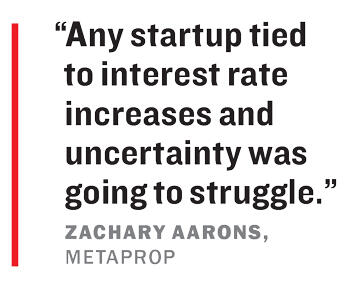
Cadre CEO Ryan Williams; Bilt Rewards CEO Ankur Jain; and Peek CEO Austin Lo
As proptech firms axed workers or hemorrhaged cash last fall, the startup Bilt Rewards was hitting unicorn status and dropping a new product to boot.
Founder and CEO Ankur Jain had launched Bilt’s core offering — a credit card allowing tenants to apply points toward a down payment — a little over a year earlier.
A $150 million fundraising round in late October bumped Bilt’s valuation to $1.5 billion. Jain seized on the boost to launch Bilt Homes, a platform that shows renters for-sale houses they can afford based on their rent and credit score.
Bilt may be the flower in the fallout. But it epitomizes the type of startup best positioned to survive a market downturn: a company founded on cautious growth, with strong reserves and a product consumers want during boom times or bust.
“Every startup can only work if you get lucky, number one, period,” Jain admitted.
2022: Party over, oops, out of time
If ultra-low interest rates were the beer fueling proptech’s pandemic-era party, Federal Reserve Chair Jerome Powell was the guy who kicked the keg.
Seven aggressive rate hikes last year sent rates soaring. As financing grew more expensive, the investors feeding venture funds pulled back.
For many startups, the shift hit like a one-two punch.
Proptech companies dependent on heavy homebuying volume saw their business models crumble once high mortgage rates stymied deals.
“It’s like a faucet got turned off,” said Zachary Aarons, a proptech investor and co-founder of venture capital firm MetaProp.
“Any startup tied to both interest rate increases and interest rate uncertainty was going to struggle,” he said. “That’s mortgage origination, that’s title agencies, that’s notaries, that’s appraisal firms.”
Publicly traded iBuyers such as Zillow and Redfin were forced out of the market, and residential brokerages from Compass to Side had to make steep staff cuts. Rent-to-own startups such as Divvy Homes announced layoffs as well.
Growth at any cost
Meanwhile, venture capitalists balked at the risk of throwing money at startups once capital became more expensive. Global capital funding for proptech in 2022 fell nearly 40 percent, to $19.8 billion from $32 billion in 2021, a report by the Center for Real Estate Technology & Innovation found.
As funding dried up, firms that had prioritized growth over profit started to feel the squeeze.
“The sin wasn’t growing too quickly; the sin was growing too inefficiently,” said Merritt Hummer, a partner at alternative investment fund Bain Capital.
It wasn’t entirely their fault: For two years, venture investors had been rewarding firms for revenue growth and largely ignored whether the firm was on track to turn a profit in the near term.
Read more



Many startups settled into that model and didn’t dream there would come a time when they couldn’t sell more shares to keep growing — or to keep the lights on.
“The North Star flipped from growth to profitability as soon as it became clear that the era of free money was over,” Hummer said.
As investors and venture firms tightened their purse strings, young firms slashed expenses to avoid running out of cash.
For example, Rhino, a startup offering landlords an alternative to security deposits, laid off 20 percent of its staff early last year. A spokesperson cited the macroeconomic environment and the need to “accelerate our path to profitability and make us less reliant on the capital markets.”
 Jain, who co-founded Rhino in 2017 and was a part of its initial leadership, said that the company had just grown too fast.
Jain, who co-founded Rhino in 2017 and was a part of its initial leadership, said that the company had just grown too fast.
Venture firms acknowledge their role in promoting an unsustainable model. Aarons said there had been a tacit agreement that startups wouldn’t need to be profitable for at least seven years.
“Then, all of the sudden, you’re telling a three- or four-year-old company that you need them to be profitable when everybody on the board approved the plan to be EBITDA-negative three months prior,” Aarons said, referring to a measure of profitability. “That’s, like, not great.”
The hamster wheel
The startups that weathered that sea change and appear strong enough to get through 2023 are united by three factors: they kept profitability in the foreground, stayed nimble and built a product that could outlast a downturn.
Jain, pointing to Rhino and his first post-college company, Humin, said he learned the importance of profitability the hard way.
With Humin, an address book that intuitively organized contacts, the founder said he took a bunch of venture capital firms’ money and their advice to “grow, grow, grow and worry about profit later.”
Three years down the line, those investors wanted to see returns, but Humin wasn’t there yet.
“We made a mistake and we ended up selling it,” Jain said. Tinder acquired the firm in 2016.
To help Bilt avoid that pitfall, Jain didn’t accept outside money until last year. The startup self-funded for its first three and a half years, then slowly built a base of long-term commercial partners.
“If you take institutional capital too early, you need to race to play catch-up and show these metrics that you may not be ready for,” Jain added.
When startups sell stakes to venture funds, those investors expect to see results. That can pressure companies to “fake growth,” Jain said, to pursue more funding rounds that raise their valuations. And the cycle repeats.
“You don’t want to end up on that hamster wheel,” Jain said.
Bilt waited until its October fundraising round to bring in institutional capital. By then, Jain said, the company was already profitable and it didn’t need to raise money again.
That’s an enviable position heading into 2023.
VCs are hard-pressed to predict proptech funding in the new year. But Nima Wedlake, a principal at venture capital fund Thomvest Ventures, said he sees it falling in proportion with the overall market.
“My hunch is if the entire venture funding landscape declines by 20 percent year-over-year, so will real estate tech,” Wedlake said.
For firms that got caught on the hamster wheel, the new year is shaping up to be painful.
Hummer said she hasn’t yet seen “down rounds,” in which new funding reduces a startup’s valuation, as many firms still have ample cash from last year’s hauls. But she expects to see some of their reserves drained and for valuations to drop in tandem.
Hummer projected that at least half of the proptech firms that have reached $1 billion valuations would “cease to be unicorns in their next fundraise.”
“Sounds about right,” said Aarons.
Lessons of the pandemic
Like Bilt, Cadre appears to be in a stable financial position heading into 2023.
“With fundraising, you generally want to do it when you don’t need to, and that gives you much greater leverage,” said Ryan Williams, who founded the commercial real estate investment platform in 2014.
Williams declined to share Cadre’s valuation, but he said the $800 million figure reported by Forbes in 2019 was “pretty outdated.” It does have public markers of growth, though, including a $5.12 billion portfolio and more than $461 million in investor returns.
The startup makes money from up-front transaction fees on real estate investments. Deals dwindled when the pandemic hit, dinging Cadre’s revenue, so Williams cut a quarter of his staff in May 2020 and halted new investments. Like just about everyone else, he didn’t realize the housing market was about to explode.
Cadre didn’t totally seize up, though. With the Fed having dropped rates to near zero, Cadre launched Cadre Cash, a savings account that guaranteed 3 percent returns. Then, as the investment sales market began to recover late in 2020, Williams went back into growth mode. The company raised nearly $400 million for a more accessible investment fund and sold 14 properties at an average profit of 27 percent.
As deals have slowed again, Williams said Cadre has backed off acquisitions and used the time to seek out the next opportunity, notably distressed assets that may offer a hedge against inflation.
“We’re not going to be caught on our back foot again,” Williams said, referring to the early months of the pandemic.
Those tweaks, MetaProp’s Aarons said, are what proptech firms with residential exposure might consider to make it through 2023.
“It’s not a pivot; it’s very soft,” he said.
A title agency heavily dependent on refinancings, for example, should build up another business line.
“Right now, mortgage rates are 7 percent; there are no more mortgage refinancings,” Aarons said. “So, I look to diversify into new home purchase, which has been hurt, but it’s still happening.”
Recession-proof businesses
The proptechs truly sitting pretty, though, are the rare ones whose business models are untethered from cyclical markets.
Peek, a company that offers landlords and property owners virtual tour and leasing services, claims it has a steady appeal.
The startup launched in 2019 and saw demand pop during the pandemic “when property owners and managers realized people weren’t showing up to go look at places anymore,” said co-founder Austin Lo.
Much like remote work, that pandemic shift has endured: Lo said that many people still choose to view a property virtually.
The firm raised $2.5 million midway through 2022, and Lo said that its subscription revenue is on track to nearly triple from a year ago. It does not comment on valuation.
When asked if the company was profitable, Lo replied, “Close enough.”
The sin wasn’t growing too quickly, it was growing too inefficiently.
Although some venture firms insist recession-proof business models don’t exist, Peek said its services cut costs for landlords and tenants. Property owners don’t need to pay for labor, and customers save money by not traveling or missing work.
“Inflation and rising rates do push operators and owners of rental housing to really look at their bottom line and rethink, ‘How can we make this more efficient?’” Lo said.
Cadre has also touted its investment opportunities as a hedge against inflation and market volatility.
The value of publicly traded REITs and the S&P 500 index both plunged more than 20 percent in 2022, but the fundamentals of commercial real estate remain strong, particularly in multifamily and logistics, given the low supply, high demand and repricing power in those sectors.
And to Bilt’s benefit, the pandemic showed that monthly rent payments, by and large, will be steady even during the worst of times.
“I mean, whether it’s a down market or an up market, people have to pay, right?” Jain said.
